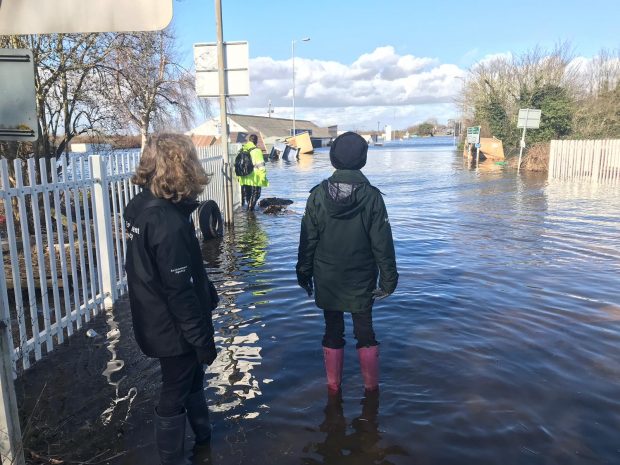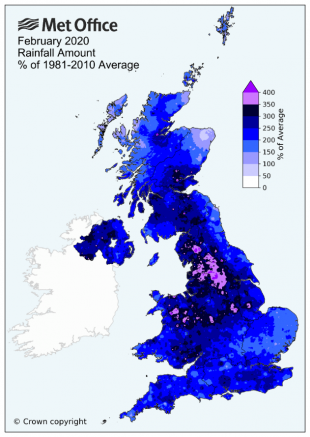
As people will have seen on ITV’s “Britain Underwater” this week, the experience of having your home or business flooded is hugely distressing. The emotional and economic damage cannot be scrubbed away with the mud. This month, I’ve met communities coping with the worst of the impacts and their grief is palpable.
Of the 5.3m properties at risk of flooding in this country, 0.08% were flooded during the autumn/winter floods, which gives you an idea of what some areas have been through recently.
The Met Office says February 2020 was the wettest February on record for England and the fifth wettest of any calendar month since 1862. In England 154.9mm rainfall fell, 258% of the average rainfall for the month. When the Met Office produce rainfall data their maps usually record up to 200% of average rainfall. Last month, they had to create a new scale above 400% for some areas.

Highest or second highest river levels on record were reached on 13 rivers including the Aire and Calder in Yorkshire and the Severn and Teme in Shropshire and Herefordshire. The levels of water have been higher than the summer floods of 2007 when 55,000 properties flooded.
I mention 2007 because I want to illustrate the progress and hard work that has gone in from the Environment Agency, the government, local authorities, Internal Drainage Boards, and local communities to improve flood protection in England. During the recent floods 127,600 properties were protected by flood defences, including 34,200 over past two weeks.
During Storm Dennis 1,000 Environment Agency staff per day were mobilised on the ground to operate flood defences and temporary pumps, clear debris from rivers, inspect damaged flood defences and make repairs. This included the deployment of over 6km flood barriers and 90 mobile pumps. It’s been hugely inspiring to see the grit and determination shown by the Environment Agency, emergency services, military and local community volunteers.
I saw that in a different way on Tuesday in Scarborough at the opening of a £16 million scheme to protect hundreds of properties from falling into the sea. The collaboration between the Environment Agency, Scarborough Borough Council, contractors and the community on the project was a timely reminder that the best flood and coastal protection is created when it’s not raining.
While I want to celebrate such work, there’s more to do. The climate emergency means we will see more of the types of storms we have seen this year, and the Intergovernmental Panel on Climate Change says once-a-century sea level events will be annual events by 2050.
Hard concrete defences are key to our response, but we can’t build limitlessly high walls and barriers. The suggestion that we can keep places dry is dangerous, because people need to remember that nature can and will find its way through: we must be vigilant and resilient. We will say more about how we intend to help people do this in our flood strategy out this spring.
It has been an extraordinary month, but the science is telling us that it may not seem so extraordinary in the near future. To better overcome the misery of flooding the country must change its approach and become more resilient.
As people learn how to do that, they can be reassured they are not alone: the Environment Agency is here to help.
Emma Howard Boyd, Chair of the Environment Agency

3 comments
Comment by Kevin Heede posted on
Hi
This is very interesting information. I would question the statistic about number of properties which flooded last winter as I suspect it was under recorded. For example I live in a small village and my house flooded but how would the EA know about it?
Comment by eileenroffe posted on
Morning - you can email in as an information request to: enquiries@environment-agency.gov.uk - we will send to area for their attention - Eileen
Comment by Janet Jackson posted on
Flooded in February 2020 and it has totally devastated us. We lost everything as we live in a bungalow and the water ingress was too fast for us to take appropriate action, even with notice it would not have been useful as we had nowhere to relocate possessions. There is only so much you can pile on a dining room table! The Agencies must take the flooding problems very seriously. It has cost millions of pounds to put right the damage and insurance companies cannot sustain the level of claims on a regular basis. We deserve to live safely in the knowledge that our properties' risk of flooding is diminished - you cannot imagine the stress when warnings are given by the Met Office of thunderstorms with possible flash flooding. Defences would not be any good as the water came up through the floor (floorboards), toilets and even the bath. Please spend some serious money on trying to protect our properties.